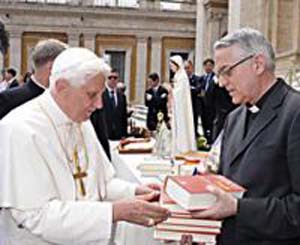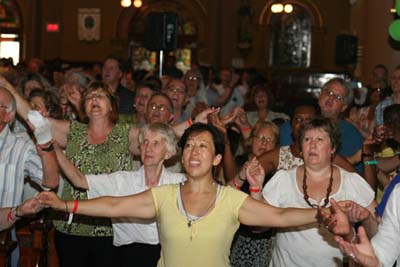 |
Consequences of Vatican II
Up-Side-Down Theology
Lyle J. Arnold, Jr.
Tradition in Action posted the article “Fr. Lonergan cheers the end of objective and deductive Catholic Theology” with this introductory commentary:
“For progressivists, theology is no longer the science of the word of God ... revealed from on high. They claim that God is immanent in each man and thus ‘reveals’ Himself. As a consequence theology would no longer be deductive, based on perennial data of Revelation. It should become inductive, experimentally drawing from fragments of ‘revelation’ that would exist in men’s souls, the secular sciences, the modern world, and so on.” (1)
The above statement is very clear, leaving no difficulty in interpretation. It indicates Progressivism propounds that revelation is generated from below, “in men’s souls,” since God is immanent in each man. This is a mega-error that contradicts Catholic teaching that the revelation of God comes from on high. Fr. Lonergan - and by extension Progressivism - are not just flirting with heresy here, rather they are making a frontal attack on the very nucleus of Catholic doctrine.

Lonergan offering Benedict XVI a copy of his work Insights |
The actual words of Fr. Lonergan are worth pondering as he forays into forbidden territory. In his collaboration to the book Renewal of Religious Thought he states:
“Theology was a deductive, and it has become largely an empirical science. It was a deductive science in the sense that its theses were conclusions to be proven from the premises provided by Scripture and Tradition. It has become an empirical science in the sense that Scripture and Tradition now supply not premises, but data. The data has to be viewed in its historical perspective. It has to be interpreted in the light of contemporary techniques and procedures. Where before the step from premises to conclusions was brief, simple, and certain, today the steps from data to interpretation are long, arduous, and, at best, probable.
“And empirical science does not demonstrate. It accumulates information, develops understanding, masters ever more of its materials, but it does not preclude the uncovering of further relevant data, the emergence of new insights, the attainment of a more comprehensive view.” (2)
Denial of Revelation
Since man is a rational animal, deduction is the method of thinking based on his rational side, while induction relies on his senses and experiences, his animal side. Deduction proves an argument true by the strength of reason, of logic, while induction only claims to provide some probability of the truth through the experience of the senses.
The Catholic Faith is the ensemble of truths revealed by God that illuminates human reason. After accepting the data of Revelation, an entire edifice of deductions was constructed by human reason in perfect harmony with the Faith. This is what theology is. Or, to be more precise, Theology (Theo = of God; Logos = word) is properly speaking the study of Revelation, while Theodicy is the study of the rational consequences of this Revelation.
When one defends that theology must become inductive, he implicitly denies that Revelation is given from on high and affirms that it is immanent in the human heart.
Hence, what Fr. Lonergan and his progressivist colleagues do is to invert the entire process of finding the revealed truth.
Denial of Catholic Scholasticism
One sees, moreover, that here Lonergan denies the very fundament of Catholic metaphysics, which in turn is the basis of Scholasticism. For the Thomistic-scholastic method is “natural reason in theology, subordinated to revelation and faith, bringing harmony between the laws of being and the laws of thought.” (3) This method of deduction dominated Western thought for more than 2,000 years.

A different religion where common emotions replace the individual logic and piety |
In Scholasticism, the deductive process reached its solstice. It was this system of philosophy and theology of St. Thomas Aquinas that Pope St. Pius X praised as being the main remedy against Modernism. (4) Deductive logic was especially useful in helping to give precision to the truths of the Catholic Church.
The Revolution seeks to do away with deductive reasoning; instead, its turns toward induction because it wants to deny the objective character of the truth. Then, once all the deductive truths are denied, it will turn to attack the very inductive logic that now is useful for the goals of the Revolution. At the end of the process, instead of the laws of induction, we will have just some vague feelings: Incoherent sentiments that spout at random in the human mind inspired by the magic spells and charms of gurus and witch-doctors. This is what some call “savage thought,” which is a thought “that does not think.”
It is the Tribal Revolution that appears as we slip down the ramp of modern thinking.
Consistent with this decay of rationality, a new theology “adapted to the needs of modern man” also is being spread: It is based on internal “revelation,” no more the deductions, as few inductions as possible and a mass of personal feelings everywhere.
Is this not what the Charismatic movement is? A religion of common feelings super-heated by a cheap mysticism, a carbon copy of the polluted Pentecostal-Protestantism.
1. "Progressivist document of the week," 9-24-05.
2. Palm Publishers, Montreal, 1968, vol. 1, pp. 37-38.
3. Dictionary of Dogmatic Theology, Milwaukee: Bruce Pup. Co., 1951, p. 283
4. Pascendi, n. 45.

Posted October 19, 2011

Related Topics of Interest
 Fr. Lonergan Cheers the End of an Objective Catholic Theology Fr. Lonergan Cheers the End of an Objective Catholic Theology
 Thoughts on Structuralism Thoughts on Structuralism
 Suenens: God as Conceived by the Catholic Faith Must Die Suenens: God as Conceived by the Catholic Faith Must Die
 Card. Ratzinger against Scholasticis Card. Ratzinger against Scholasticis
 Congar: Council Theologians Adopted the Modernist Notion of Revelation Congar: Council Theologians Adopted the Modernist Notion of Revelation
 Suenens: Vatican II Broke with the Past of the Church Suenens: Vatican II Broke with the Past of the Church
 Chenu: To Demand the Acceptance of Thomism is Abuse of Power Chenu: To Demand the Acceptance of Thomism is Abuse of Power
 Congar: Theology Must Be Turned toward Man and not toward God Congar: Theology Must Be Turned toward Man and not toward God



|
Vatican II | Hot Topics | Home | Books | CDs | Search | Contact Us | Donate

© 2002-
Tradition in Action, Inc. All Rights Reserved
|
 |
|